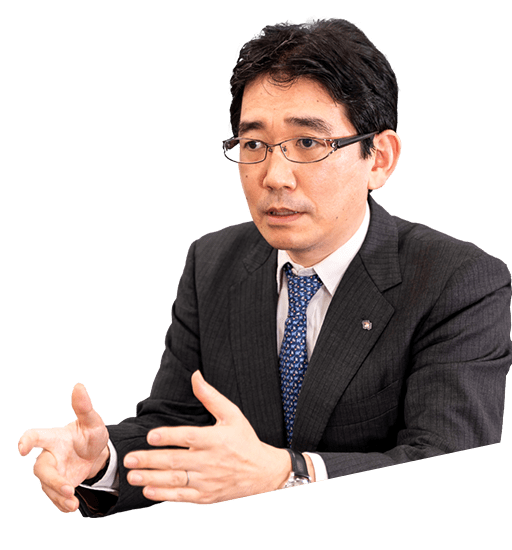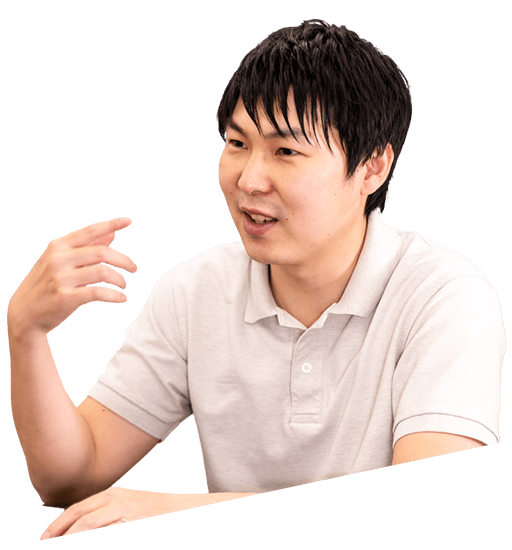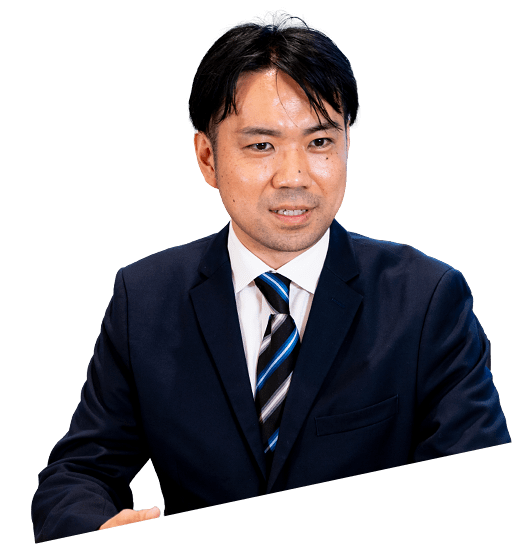Pursuing a world’s first at the center of a paradigm shift
in asset management technology.
Aiming for both academic research and social implementation.
INTERVIEW / KEI NAKAGAWA
KEI NAKAGAWA
Joined the company in 2018
Kei joined Nomura Asset Management in 2018 after working at another asset management company from April 2012 where he had experienced risk management, quantitative fund management, and quantitative investment strategy development. Since April 2021, he has been a Research Fellow in the AI/Machine Learning Team of the Innovation Lab Department.
![]()
The field of asset management is full of research seeds.
― I heard that you have completed your master's and doctoral courses while working for a company. Please tell us about your career path so far.
industry has been actively engaged in engineering research applying knowledge gained from natural science to solving problems in the real world. Financial engineering is a field of study that quantitatively prices financial derivatives and allocates assets in asset management based on probability analysis and statistical analysis, taking into account the uncertainty of financial markets.After completing my undergraduate study, I decided not to continue on to graduate school, but to join an asset management company as a new graduate. This was because I felt that I needed to gain practical experience in fund management as soon as possible in order to apply my efforts not only to academic research but also to industrial applications. However, when I actually experienced fund management, I felt that it was important to incorporate methods from other research fields, such as machine learning, in addition to traditional financial engineering, so I attended graduate school while conducting investment management work. I engaged in research to develop new investment models from statistical and information science approaches, such as machine learning. After completing the master’s program while working as a business person, I moved to Nomura Asset Management. I continued my doctoral course, and last year I received a Ph.D. degree.
― It must have been challenging to work for a company and attend graduate school at the same time, but what did you gain by daring to attend graduate school?
I believe that by going back and forth between practice and research, I can achieve good feedback for both. Financial engineering has always been a field where there is a lot of interaction between practice and research, and this is one of its major attractions.For example, asset management companies have a business called quantitative fund management, which is based on mathematical and statistical methods, including financial engineering. In order to improve the performance of quantitative fund management, it is necessary to find a method that incorporates data that has not yet attracted attention in the market or new knowledge that other fund managers are not using. In this regard, there are many opportunities to get better ideas through interactions among researchers in university laboratories, at international conferences, etc. On the other hand, by discussing practical issues with fund managers, I sometimes become aware of new research themes in the field of asset management. This idea of the importance of continuing to explore new methods from both the academic world and the asset management field has not changed, and I continue to place importance on academic activities even after completing my doctoral course.
― After working and researching, why are you currently working at Nomura Asset Management?
When I was thinking about eventually concentrating on research, the timing coincided with the establishment of a new research organization called the Innovation Lab within Nomura Asset Management, and the founding leader of the organization asked me if I would like to work with him. Since this new research organization is quite close to the team responsible for practical fund management, I thought that I could further accelerate my research activities in this environment where I could focus on research activities while remaining rooted in practical matters.
― What was the decisive factor in choosing the Nomura Group?
The Nomura Group has long been involved in the development of quantitative fund management and its methods, and is a pioneer in Japan. Nomura Asset Management is one of the largest asset management companies in Japan, with about 70 trillion yen in assets under management, and is also active in overseas partnerships, including capital partnerships with an U.S. asset management company. Such business infrastructure will be a strength in attracting excellent talents, and I believe that I will be able to improve the quality of my research by deepening my collaboration with excellent fund management teams. This was an inevitable choice for me, as I wanted to work on research whose results would be recognized globally.
![]()
From financial engineering to machine learning: the thrill of working at the forefront of a major shift in the asset management paradigm.
― What are your current main responsibilities?
As a Research Fellow, I am currently working on various R&D projects and disseminating the results both internally and externally. On the practical side, my duties include creating strategies for new investment products and solving problems that emerge from the field by utilizing the knowledge I gain from my research. On the research side, I develop new methods and technologies, explore the applicability of new technologies to finance through joint research such as industry-academia and business-to-business collaborations, and publish the results in academic papers.
― What would you say is the state of research on asset management in general?
First of all, in terms of the environment surrounding the research, there are already a vast number of studies of applied research on machine learning, as seen in image processing and natural language processing. However, when it comes to the application of machine learning to the financial field, the number of published research results is quite limited. In terms of industrial applications of machine learning, research in the field of finance may be said to be one step behind.
― Under such circumstances, what kind of initiatives are you undertaking?
There are many machine learning techniques that have yet to be validated in asset management practice, but that does not mean that simply applying the original model as is will produce results. This is due to various characteristics such as the large amount of noise in financial data. Therefore, in order to develop highly effective models in the field of asset management, we are engaged in research to reconstruct machine learning models based on deep insights into financial engineering and practical fund management.
― To the extent that you can disclose, please let us know if you are working on any specific research projects.
For example, when we try to use deep learning for time-series estimation such as future stock price estimation, we need to change the structure of deep learning itself so that various characteristics of time series of stock prices are taken into account. As an example, in past empirical studies, a characteristic called "volatility clustering" is known, in which autocorrelation is difficult to be found in the future returns of stock prices themselves, but positive correlation can be found when the absolute values of the returns are considered. In addition, when we look at the time series of stock prices in various time scales such as hours, days, and weeks, we cannot distinguish between different time scales, which is called “fractal nature.” We have demonstrated that improving the structure of deep learning to better capture these characteristics of the time series of stock prices can improve investment performance.
As another example, in the field of machine learning, there is a technique called transfer learning. Simply put, it is a technique where an algorithm trained on one data set is modeled so that it can be used for inference on another data set. The research we conducted indicated that applying this technology can improve the accuracy of future price estimation in Asia or other markets with limited available data by transferring a model trained in a market, such as the U.S., where there is abundant financial market data. In transfer learning, as it is important to determine how much of the training data should be learned and how the learning should be stopped, we also proposed our own training stopping criteria to address the research issues in asset management.― Until now, research in the field of finance has been centered on financial engineering, but with the incorporation of machine learning and other technologies, the scope of research is expanding, causing a paradigm shift to be taking place. Under such circumstances, what is required of researchers?
Since only a few machine learning technologies newly proposed at international conferences have been applied to asset management, it is important to try them out and verify their effectiveness as soon as possible. For example, BERT, a natural language processing technology, has been attracting attention as a breakthrough in society. As soon as BERT technology appeared, we improved it to handle Japanese financial data and reported its effectiveness at an academic conference. We have also been working on XAI (Explainable AI), which has been attracting a lot of attention recently, for the past three years from a practical standpoint. For deep learning, which had been considered as a black box, we introduced a method called Layer-wise Relevance Propagation (LRP) to be consistent with the models used in the conventional financial field, and also proposed an algorithm to visualize to the degree of the impact of each input data on the output.
Cutting-edge research accepted at several top AI-related conferences where the world's top researchers compete: Let's be a part of the pioneering team to create the next standard in asset management.
― I heard that you published more than a dozen papers in the three years of your doctoral course, in parallel with your research in practice. This is an astonishing number, as it is said that only a few papers are needed to fulfill the requirements for completion of a doctorate. In addition, some of your papers have been accepted by top AI-related conferences such as AAAI (Association for the Advancement of Artificial Intelligence) and IJCAI (International Joint Conferences on Artificial Intelligence), which are said to be the most competitive conferences in the world. Top researchers from all over the world, not only from universities but also from corporate research centers of such companies as Google and Facebook, submit papers to these conferences. I have been told that the number of papers accepted at these conferences is very limited among those submitted from throughout Japan, not only in the field of finance but in all fields. Is there any mechanism to support such creative research activities, especially in the field of finance where there are few precedent relevant studies?
One of the reasons for this is that the Innovation Lab has a culture that encourages research activities such as publishing papers externally and participating in international conferences. In fact, in addition to encouraging research presentations, the company also provides support as a system for enhancing one's expertise as a working doctor.From the perspective of asset management practice, it is honest to say that there are some researches that cannot be presented to the public in order to maintain our competitiveness as a company. Nevertheless, the company recognizes the importance of publishing our research to increase our presence at academic conferences and other venues, and to quickly adopt and develop cutting-edge approaches emerging outside the world of finance.
― Lastly, please tell us about what kind of challenges you would like to take on in the future.
Only recently, the application of machine learning to the field of finance has finally entered a period of development, and workshops on the subject of finance have begun to be held at major international conferences. Still, very few studies have been undertaken, and the number of researchers with expertise in both machine learning and finance is still small, which means that there is a lot of room for growth. We strongly welcome ambitious researchers who want to work with us at the forefront of research and practice to create original asset management technology that will become the standard for the future. Because there are few precedents, pioneering spirit is imperative, and a self-directed attitude to continue research is required. We hope that researchers with diverse specialties will mutually stimulate each other, accumulate their wisdom, and pool their collective efforts to pioneer the forefront of asset management research together.

Do not stop with theory. Demonstrate your skills in complex financial systems.
FUMIO KAWAMOTO

Pursuing a world’s first at the center of a paradigm shift in asset management technology. Aiming for both academic research and social implementation.
KEI NAKAGAWA

Contribute to the global business market through cross-border team collaboration
KENJIRO OYA
Application period for 2024 has ended. Thank you for your interest and hope to see you next year.
MESSAGE_Message
Significance of choosing the Nomura Group as your partner after completing your doctorate.
NEW RECRUITMENT PROGRAM_What is the Nomura Passport?
Introducing the “Nomura Passport,” a new system for doctoral students.
INTERVIEW_Career trajectories for Ph.Ds
What comes after acquiring your doctorate? The Nomura Group staff at work.
WORKSHOP AREAS_Workshop hosting departments
Here is where you can prove yourself, and here are the fields that await you.

